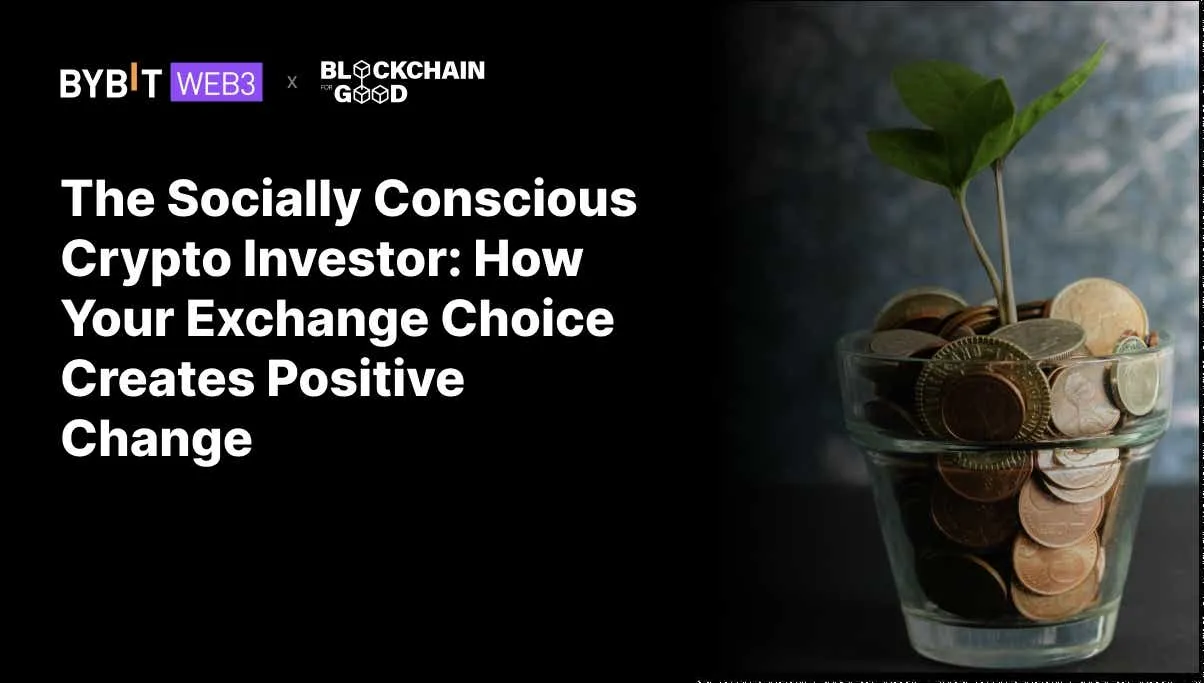
The Socially Conscious Crypto Investor: How Your Exchange Choice Creates Positive Change
There’s a growing public focus on ethical and sustainable investments.

In 2020, investors poured a record $12.2 billion into funds dedicated to environmental, social, and governance (ESG) factors. Experts predict that socially responsible investing (SRI) will become a $50 trillion field in the next 20 years.
In light of this shift, it’s important to explore how crypto and blockchain can align with these values, contributing to a better world.
Key Takeaways
- Why socially responsible investment avenues matter and how blockchain can offer impactful solutions for underserved populations globally
- How to get involved as a trader by exploring socially responsible investing
- How Bybit and Blockchain for Good Alliance are solving real-world problems through global projects
Visit BGA website for more details.
Crypto and Blockchain: The future of socially responsible investing
Cryptocurrencies and blockchain are not just reshaping financial landscapes but also opening new avenues for socially responsible investing. Here’s how:
Financial inclusion: With nearly 1.7 billion people globally unbanked, cryptocurrencies offer a lifeline by enabling cross-border payments for those with limited access to traditional banking services.
In regions like Sub-Saharan Africa and Southeast Asia, where banking infrastructure is sparse, cryptocurrencies provide a means for individuals to participate in the global economy without relying on traditional financial institutions.
Remittance costs can be as high as 7% in some regions, but cryptocurrencies offer a cheaper and faster alternative, reducing transaction costs and increasing access to financial services for underserved populations.
Supply chain transparency: Blockchain enables transparent and traceable supply chains, combating issues like forced labor and environmental degradation. Initiatives like IBM’s Food Trust blockchain offer end-to-end traceability for products, empowering consumers to make informed and ethical purchasing decisions.
For instance, by scanning a QR code on a product, consumers can access detailed information about its origin, production process, and journey to the store. This transparency promotes ethical consumption and supports sustainable practices.
Secure digital identity: In regions lacking official identification, blockchain offers secure and tamper-proof digital identities, facilitating access to essential services like healthcare and education.
Projects like the ID2020 Alliance aim to provide verifiable digital identities, empowering underserved populations and driving social and economic development.
By leveraging blockchain’s immutability and cryptographic security, these initiatives ensure that individuals have control over their identity data and can access services without relying on centralized authorities.
Digital identity systems can lead to significant economic benefits, including increased access to financial services and improved social inclusion.
However, integrating cryptocurrencies and blockchain into socially responsible investing comes with its own set of challenges:
Energy consumption: The energy-intensive nature of cryptocurrency mining, particularly evident in Bitcoin, contributes to environmental degradation. Yet, innovations like Ethereum’s transition to proof-of-stake and the adoption of renewable energy sources offer hope for a more sustainable future.
Renewable energy accounts for 39% of total cryptocurrency mining energy consumption — there’s still potential for greener mining practices to mitigate environmental impact.
Security concerns: While blockchain technology itself is secure, incidents of theft and fraud highlight the importance of safeguarding private keys. Losses from cryptocurrency theft, hacks, and fraud amounted to $1.9 billion in 2020, according to a report by CipherTrace. There’s a need for enhanced security measures.
Thankfully, initiatives like multi-signature wallets and hardware security modules (HSMs) are gaining prominence. These measures offer additional layers of protection against unauthorized access, ensuring the integrity of cryptocurrency transactions and bolstering investor confidence in the crypto ecosystem.
By addressing these challenges and embracing the transformative potential of cryptocurrencies and blockchain, socially responsible investors like yourself can pave the way for a more inclusive, transparent, and sustainable financial future.
How to boost your portfolio with socially responsible investments
To effectively integrate cryptocurrency into socially responsible investing, you should consider several strategies:
1 Conduct thorough research
Always conduct thorough research to ensure that the projects you invest in align with your values. Evaluating the environmental impact, social benefits, and governance practices of these projects is crucial.
For example, platforms like As You Sow provide tools to assess the ESG (Environmental, Social, and Governance) impact of various cryptocurrencies and blockchain projects. This involves examining:
- Environmental impact: Consider the energy consumption and carbon footprint of the cryptocurrency. Some cryptocurrencies use more energy-intensive proof-of-work consensus mechanisms, while others utilize more energy-efficient models like proof-of-stake. Evaluating the energy usage and environmental strategies of each cryptocurrency can help you choose those that align better with your sustainability values.
- Social benefits: Assess how the project contributes to social good. Does it promote financial inclusion by providing banking services to unbanked populations? Does it support charitable activities or disaster relief efforts through transparent and efficient donation mechanisms?
- Governance practices: Look into the project’s governance model. Decentralized Autonomous Organizations (DAOs) often provide more democratic and transparent decision-making processes compared to traditional corporate structures.
By understanding the ethical implications of your investments, you can make informed decisions that support their values and contribute to positive social change.
2 Invest in projects for social good
You can choose to support blockchain projects that prioritize social good. For instance:
- Ethereum’s Transition to Proof-of-Stake (PoS): Ethereum’s shift from a proof-of-work (PoW) to a proof-of-stake (PoS) mechanism is a significant step towards reducing its energy consumption. PoS is estimated to be 99.95% more energy-efficient than PoW, making Ethereum 2.0 a more environmentally friendly option.
- UCO Network: The UCO Network is an innovative ecosystem focused on recycling used cooking oil (UCO) to promote sustainability and economic growth. By leveraging blockchain and IoT technologies, the UCO Network ensures trust, transparency, and traceability in the UCO recycling chain. The platform incentivizes participation through its “Recycle-to-Earn” model, offering rewards to collectors, biofuel producers, households, and compliance bodies.
- Libera Global AI: Libera Global AI fosters financial inclusion, empowers small merchants, and creates a transparent and inclusive retail ecosystem. Through data-driven insights and AI-powered tools, the platform promotes economic empowerment and sustainable growth in emerging markets.
3 Trade in crypto exchanges that support social initiatives
As a trader, you have the power to make a difference by choosing exchanges and platforms that prioritize social impact alongside financial returns.
For example, Bybit is committed to supporting social initiatives through its partnership with the Blockchain for Good Alliance (BGA). Here’s how Bybit is making a difference:
- Funding hackathons focused on creating social impact through blockchain solutions, fostering innovation and supporting the development of socially beneficial technologies.
- Providing resources for educational initiatives, helping to raise awareness and understanding of blockchain technology’s potential for social good.
- Supporting projects that promote sustainability, financial inclusion, helping to provide financial services to underserved communities and reducing economic inequality.
By trading responsibly on crypto exchanges like Bybit, you are not just investing in your financial future but also contributing to meaningful social impact.
Together with Bybit and the Blockchain for Good Alliance (BGA), you can be part of a movement that harnesses the transformative potential of blockchain technology to build a better world.
Join us in reducing transaction costs for remittances, improving the transparency of charitable donations, and driving positive change through cryptocurrency and blockchain technology.
This article is written in collaboration with Bybit Web3 and Felicia Tan, Partner at BGA.
Disclaimer:Mention of specific projects or initiatives should not be construed as an endorsement or recommendation by BGA or its partners. This content is provided for informational purposes only and does not constitute a listing or promotion by Bybit.